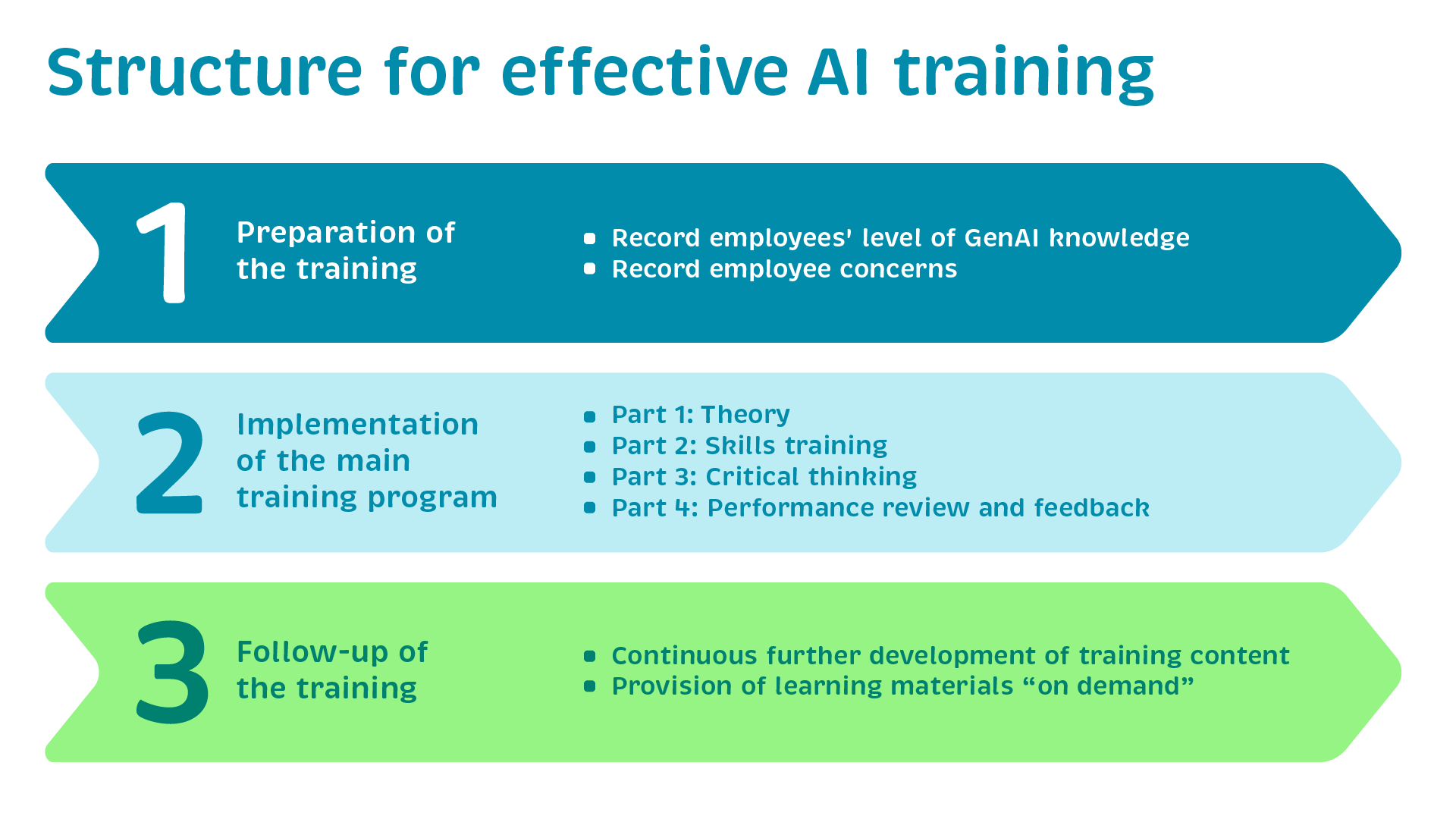The success of implementing artificial intelligence (AI) applications in companies hinges on empowering the workforce. The ongoing digital transformation offers companies immense opportunities to boost their efficiency and innovation. AI plays a crucial role in automating processes, generating creative content, and making informed decisions. Specifically, generative AI (GenAI), such as ChatGPT or Microsoft Copilot, has the potential to fundamentally transform businesses and significantly enhance their competitiveness.
One of the biggest challenges for companies in adopting GenAI is empowering employees to use the technology effectively and integrate it into their daily work. Without tailored training programs, organizations cannot fully harness the potential of tools like Copilot, and the risk of misuse increases. The diverse applications and varying knowledge levels of the workforce make developing effective training approaches even more crucial.
Searching for the ideal AI training concept
A recent study conducted by the Technical University of Darmstadt in collaboration with Campana & Schott identifies the training methods and content that motivate and sustainably support employees in this context.
The responses from 184 participants from German companies with at least 250 employees clearly indicate that AI training must be tailored to the needs of the employees, from group size to practical content. Feedback mechanisms play a crucial role in fostering engagement and successfully integrating AI tools into daily work routines.
Recommendation:
Based on the study results and a comprehensive literature review, the following recommendation for structuring AI training is proposed:

Phase I:
→ Training Preparation:
Begin by assessing employees' basic knowledge, identifying existing knowledge gaps, and addressing concerns about the ethical use of GenAI. This initial assessment helps customize the training content to meet specific organizational needs and align with the current knowledge level of the employees.
Phase II:
→ Implementation of the main training program:
- Theory – Basic Knowledge and Introduction to AI and GenAI: Start by providing essential foundational knowledge that all participants can refer to at any time. This section covers the fundamental principles of AI, an overview of GenAI, ethical considerations, and practical applications.
- Skills Training – Practical Application and Prompt Engineering: Next, teach techniques for effective prompt creation, understanding the limitations of GenAI, and common use cases. Follow this with practical scenarios tailored to the organization, role-based usage scenarios, and best practices for efficient tool use. The methodology includes interactive, scenario-based exercises and case studies where employees can apply prompts and explore outcomes.
- Critical Thinking – Performance Limitations and Risk Awareness: Offer training on ethical and practical considerations, data privacy, potential misuse, and risk mitigation. Focus on scenario analyses and discussions of real cases (e.g., data privacy breaches) to foster critical thinking. This can be achieved through group discussions, peer-learning sessions, and ethics workshops that provide space for reflection and knowledge exchange.
- Performance Review & Feedback – Measuring Effectiveness and Feedback Mechanisms: Finally, conduct pre- and post-surveys, regular assessments, and feedback sessions to measure knowledge retention, practical skill application, and employee satisfaction.
Phase III:
→ Follow-up of the training:
Regularly update the curriculum based on employee feedback and technological advancements to ensure its relevance. Provide additional learning materials, such as video tutorials and a discussion forum, to offer ongoing support. Quarterly update sessions will keep employees informed about developments in GenAI and current best practices.
It can also be noted that:
- An AI transformation will only be successful if the workforce is adequately empowered to use the technology.
- Effective AI training requires a multi-layered approach that combines practical application with critical thinking.
- Key focuses include prompt engineering and the ability to influence the quality of AI outcomes.
- Actively involving the workforce in the training concept promotes acceptance and sustainable integration of GenAI.
- Regular feedback and evaluation mechanisms ensure continuous improvement and adaptation to technological developments.
- Companies must foster a learning culture that promotes continuous growth, ethical responsibility, and employee motivation.
We support you in your AI transformation
Are you looking to implement AI transformation in your company? Seeking effective adaptation and change management strategies? Want to create a learning culture that boosts your organization's innovation and resilience? Get in touch with us.
Social Collaboration Study
Get ready for the 7th edition of our German Social Collaboration Study, set to be released at the end of March this year.
Sign up today, and we'll automatically send you the study results as soon as they're published:


